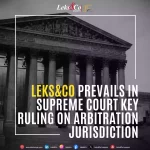Background
On 23 March 2020, the Supreme Court issued a Circular Letter No. 1 of 2020 concerning Conduct Guidelines during the Period of Preventing the Spread of Corona Virus Disease-19 (COVID-19) in the Vicinity of Supreme Court and Lower Judiciary Bodies (hereinafter called as “SCL 1/2020”)
This rule is based on the legal principle, Salus Populi Suprema Lex Esto. For this reason, SCL 1/2020 regulates as follows:
Work From Home Mechanism for Judges and Court Apparatuses, including:
- Implementation of court administration using e-court applications;
- Carrying out trials using the e-litigation application.
Court Trials
Based on SLC 1/2020, several court proceedings, such as:
- Criminal case;
- Military crime, and
- Jinayat (adjusted to qanun)
The aforementioned case will continue to be held if that the defendant is being detained and his term of detention cannot be extended further during the period of preventing the spread of COVID-19 in the Vicinity of Supreme Court and Lower Judiciary Bodies.
Meanwhile, if the detention period can still be extended, the trial of the case will be postponed (the postponement of the trial can be carried out with a single judge) until the end of the period of preventing the spread of COVID-19 in the Vicinity of Supreme Court and Lower judicial body.
As for certain cases that are limited by the period of examination under the law, the Judge may postpone the examination even if the examination deadline is limited by the provisions of the legislation. The Substitute Clerk has to make notes in dossier (official report).
Trial Situation
Based on SCL 1/2020, there are things that should be noted:
- Implementation of restrictions on the number of trial visitors;
- Application of safe distance restrictions between court visitors (social distancing);
- Body temperature checks and restrictions on physical contact for the parties present or presented to be heard by the court.
Closing
Since the enactment of SCL 1/2020, the Circular Letter of the Secretary of the Republic of Indonesia Supreme Court Number 1 of 2020 concerning Adjustment of the Work System of Judges and Judicial Apparatuses in Preventing the Spread of COVID-19 in the Vicinity of Supreme Court and Lower Judicial Bodies is revoked and declared invalid.
Kexia Goutama







